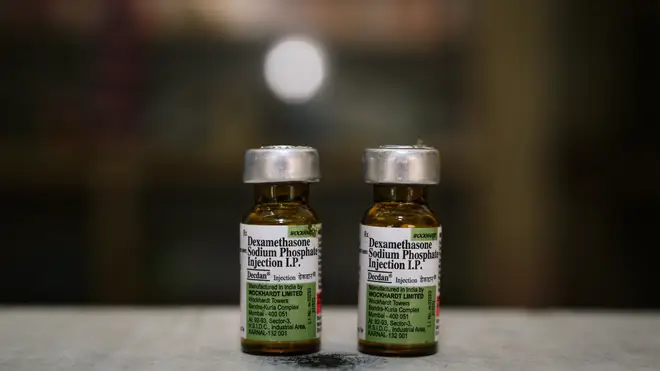
Nick Abbot 10pm - 12am
2 September 2020, 15:06 | Updated: 2 September 2020, 21:56

Cheap and readily available steroids have been found to reduce the risk of death in critically ill coronavirus patients by 20%, according to a study.
An international team of researchers analysed seven trials involving three different types of anti-inflammatory corticosteroids.
The study, which was co-ordinated by the World Health Organisation (WHO) and analysed by the National Institute for Health Research (NIHR) at the University of Bristol, looked at patient mortality over a 28-day period after treatment.
It found that treatment with one of three types of corticosteroid led to an estimated 20% reduction in the risk of death.
Researchers said it was equivalent to about 68% of critically ill patients surviving after treatment with the steroids, compared to approximately 60% surviving without them.
The results of the study, which involved the drugs dexamethasone, hydrocortisone and methylprednisolone, were published in the Journal of the American Medical Association on Wednesday.
Read more: Record-breaking number of migrants reach UK shores in single day
Read more: Former Italian PM Silvio Berlusconi tests positive for Covid-19

Vaccine trialist feels "part of war effort" in act of resistance against Covid-19
Jonathan Sterne, professor of medical statistics and epidemiology at the University of Bristol, said: "Steroids are a cheap and readily available medication, and our analysis has confirmed that they are effective in reducing deaths amongst the people most severely affected by Covid-19.
"The results were consistent across the trials and show benefit regardless of age or sex."
He explained that the findings pointed to "eight fewer deaths for every a hundred critically ill patients assigned to corticosteroids".
The seven control trials recruited 1,703 critically ill coronavirus patients from 12 countries from February to June.
The study included patients who were taking part in the Oxford University-based Recovery trial, which used the drug dexamethasone.
Patients were randomised to either receive one of the three drugs or a placebo.
Read more: David Blaine flies over Arizona desert holding helium balloons
Read more: Joe Biden raised record-breaking $364m in August

Virologist explains why so many Covid-19 cases are occurring amongst young people
Researchers said the mortality results were consistent across the seven trials, with dexamethasone and hydrocortisone giving "similar effects".
But there were too few patients involved in tests of methylprednisolone to enable researchers to estimate its impact with precision.
The study found that the steroids benefited patients regardless of whether they were on a ventilator.
But researchers said it appeared to have a greater effect on those who did not require medication to support their blood pressure.
The Recovery trial, which used dexamethasone, found the drug reduced deaths by up to a third among patients on ventilators, and by a fifth for those on oxygen.
Scientists from Brazil, Canada, China, France, Spain, the UK and the USA were involved in the study.
Listen & subscribe: Global Player | Apple Podcasts | Google Podcasts | Spotify
Martin Landray, professor of medicine and epidemiology at the University of Oxford, who leads on the Recovery trial, said: "These drugs have been around for decades, they are the sort of drugs that every medical student learns almost as soon as they open a clinical pharmacology text book."
He said dexamethasone and hydrocortisone, which can be taken orally or intravenously, were "widely available, cheap, well understood drugs".
As an example, he said treating 12 people with dexamethasone costs around £60.
But he warned that the "impressive" results "are not sufficient to lead to a complete resumption ... of life as we knew it".
He said that social distancing and wearing face masks "remain as important as ever".
Anthony Gordon, professor of anaesthesia and critical care, NIHR Research Professor, Imperial College London, who led one of the individual trials said the findings were "not a cure".
"The real advantage is that we understand now it is a class effect of the steroid, that there is more than one choice. This means that there should be better world supply, there shouldn't be any shortages," he said.
Prof Gordon, an intensive care consultant, said hydrocortisone could be used "straight away", with it being available in intensive care units in the UK.
But Prof Landray said data showed hydrocortisone was not effective in patients with milder cases of disease.
He said: "This is not a treatment for prevention, this is not a treatment for early out patients, general practice type cases, this is a treatment for people who are sick.
"This is a treatment for people who are in hospital who need oxygen, who've got complications from Covid."
NHS chief executive Sir Simon Stevens said: "One of the distinctive benefits of having our NHS is that we've been able to mobilise quickly and at scale to help researchers test and develop proven coronavirus treatments.
"Just as we did with dexamethasone, the NHS will now take immediate action to ensure that patients who could benefit from treatment with hydrocortisone do so, adding a further weapon in the armoury in the worldwide fight against Covid-19."
Updated WHO guidance is due to be published on its website on Wednesday, Prof Sterne said.
Professor Jonathan Van-Tam, deputy chief medical officer, hailed the work of UK researchers and trial participants.
He said: "It is impressive to see so many UK participants willing to take part in studies, and able to volunteer due to the rapid recruitment response of the NIHR's Clinical Research Network.
"Research such as this will make the difference in controlling this virus."